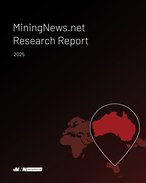This article is 5 years old. Images might not display.
The project agreement was signed this week by Geoscience Australia and the United States Geological Survey.
It follows an initial agreement between the two countries in early 2018.
"This is a partnership that will deliver opportunity and security to both nations," Australia's resources minister Matt Canavan said.
"Growing global demand for critical minerals means there is huge scope for Australia to develop secure and stable supply chains to meet the growing demand for critical minerals in key economies such as the US.
"The US has a need for critical minerals and Australia's abundant supplies makes us a reliable and secure international supplier of a wide range of those, including rare earth elements."
The agreement is set to focus on joint critical mineral potential mapping and quantitative mineral assessments, determining geological controls on critical mineral distribution, and developing data analytics capability to understand supply and demand scenarios for developing the critical minerals pipeline.
China dominates the global supply of rare earths and the US has been looking to reduce its reliance on China as trade tensions between the two countries continue.
Rare earths contender Northern Minerals said this week it would be part of an Australian critical minerals delegation to Washington DC led by Canavan.
The Western Australia-based company is aiming to become the first significant world producer of dysprosium outside of China through the development of its Browns Range project in the state's north.
Canavan has said Australia was one of the top five producers of critical minerals such as antimony, manganese, rare earths, and ilmenite and rutile - two titanium minerals - and was the second largest producer of rare earths, with 13% of global production.























